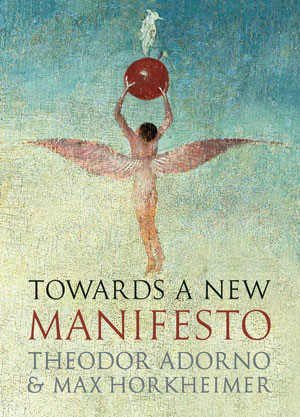 Towards a New Manifesto by Theodor Adorno and Max Horkheimer, translated by Rodney Livingstone (Verso)
Towards a New Manifesto by Theodor Adorno and Max Horkheimer, translated by Rodney Livingstone (Verso)
Great intellectual partnerships have a certain kind of allure: think of Sartre and de Beauvoir, Marx and Engels, Deleuze and Guattari. We wonder how it would work, writing together, arguing together, thinking intensely along the same lines but diverging at others. Theodor Adorno and Max Horkheimer, born eight years apart, spent many years in frictional exchanges before coming together to produce one of the 20th century’s most important texts about culture and history, Dialectic of Enlightenment, written and published in the 1940s. Their denunciation of the “culture industry” remains a touchstone for anyone trying to understand the relationship between “high” and “low” culture and the commodification of enjoyment under capitalism.
This short manifesto, from 1956, is a curious document – puzzling and provocative in turn, it opens up the idea of intellectual partnership and reveals the myriad contradictions that lie at the heart of all such collective endeavours. While apparently indebted to Marx and Engels’ Manifesto, Adorno and Horkheimer’s exchange is nothing like as definitive. Where, a century before, Marx and Engels had explained the history of working-class struggle and impelled workers to unite in the name of a future without economic and social exploitation, here we see Adorno and Horkheimer laying bare their doubts and uncertainties: “The whole of art is always both true and false. We must not succumb to the ideology of work, but we cannot deny that all happiness is twinned with work,” says Adorno. “To achieve the condition of an animal at the level of reflection – that is freedom. Freedom means not having to work,” responds Horkheimer.
Sometimes opaque and frequently aphoristic, the dialogue between the pair covers a series of interlinked topics: the relationship between work, spare time and freedom, individualism, the relationship between theory and practice and the question of utopianism (“We might almost say that the dialectic, which always contains an element of freedom, has come to a full stop today because nothing remains outside it. What Hegel and Marx called utopianism has been rendered obsolete by the present stage of history,” says Adorno; “That is a reversion to utopianism,” says Horkheimer). There are frequent references to animals (“Philosophy exists in order to redeem what you see in the look of an animal,” says Adorno at one point). If this is a manifesto, or something on its way to becoming one, it is a deliberately obscure and ironic one, neither pushing a coherent line nor recommending any course of action, but then again, as Adorno says: “Argument is consistently bourgeois,” to which Horkheimer responds that, nevertheless, “It is our cursed duty to marry thinking with right practice.”
As an introduction to the work of two thinkers, this short dialogue is as revealing as it is infuriating – infuriating, that is, if you’re looking for clear answers. If you want to see instead the inner workings of an intellectual partnership with all its antagonisms, impasses, flashes of brilliance, then this book is a perfect place to start.

